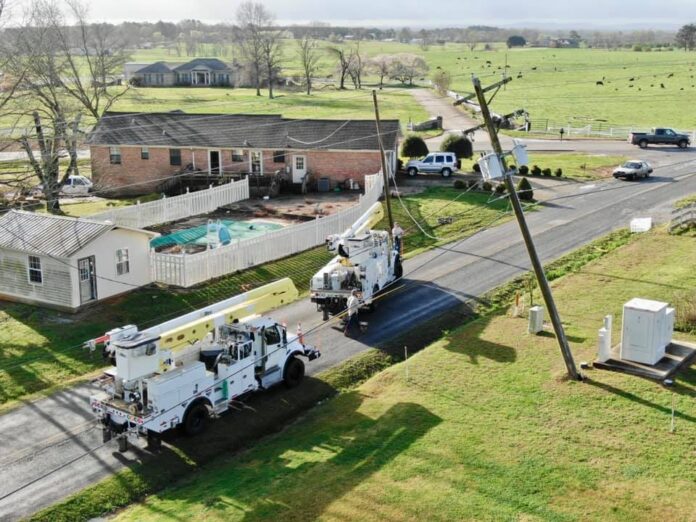CULLMAN, Ala. – Over 1400 members in Cullman Electric Co-op’s service area were without power from about 8:00 p.m. – 1:00 a.m. due to storm related damage Wednesday, Dec. 29. About 1000 members lost power on January 2 and the power crews along with the Cullman Electric Co-op, worked through the night to restore it in those areas.
Cullman Electric Communications Manager Brian Lacy said, “Every outage that gets caused due to weather is unique.”
The recent outages were caused by high winds and downed trees on lines. Lacy continued, “The challenge in those is finding them a lot of the time, when you’ve got over 3500 miles of power lines to maintain. We can use our technology here at the office to narrow down the area where an outage occurred.” Sometimes finding the exact location and then being able to then do the repair work only takes a short time, but other times can take several hours.
Everyone should have a plan ready to stay safe during power outages. The American Red Cross provides these tips:
- Create a support network. Identify people who can help you stay at home or evacuate during an extended power outage. Keep a paper copy of your contact list.
- Stay connected and alert. Sign up for alert systems and apps for text alerts. Have communication devices that work without home power, including a crank or battery radio, a non-cordless home phone and chargers/batteries for your cell phones and your computers.
- Stock food and water. Store non-perishable food and water supplies for at least two weeks. Plan to use coolers and ice to extend food refrigeration and keep a thermometer in the fridge, freezer or cooler to monitor the food temperature.
- Know and plan for your personal and medical electrical needs. Take an inventory of your electrical needs. Consider both back up and non-power alternatives for lighting, communication, medical devices and refrigerated medicine, cooking, garage doors, locks and elevators. Discuss a plan with your primary care or medical device providers for your medical needs.
- Install smoke alarms and carbon monoxide alarms. Install smoke alarms with battery backup on every floor, inside and outside sleeping areas. Test monthly. Make sure that you have one carbon monoxide detector on each level of your home.
- Plan for surge protection. Make sure that you have current surge protectors for household electronics.
- Plan how to decide to stay or go. Plan how and when you will evacuate safely to maintain needs, such as power-dependent medical devices. Keep your car gas tank at least half full.
During the winter, it is especially important to seal air leaks, replace old door seals, insulate well to prevent heat from escaping and cold air from entering your home. This helps to keep your house warm during a power outage and reduces electric bills.
Bundling up in warm clothes, heavy socks and blankets is important to stay warm. Creating a micro-environment for your family, such as tents and sleeping bags is a good way to retain heat during an extended outage.
The best way to stay warm during a power outage is to have a generator. “Safe Electricity” provides these essential tips for safe generator operation:
· Do not connect portable generators directly to a home’s electrical system. Doing so could
re-energize overhead powerlines and endanger the lives of utility linemen working to
restore power.
· There should be nothing plugged into a portable generator before starting it to prevent a
surge from damaging the appliance.
· When running a portable generator, always use properly rated extension cords (length and
load) when connecting appliances.
· Always operate portable generators in a well-ventilated space to avoid carbon monoxide
poisoning and other harmful fumes. Never run a generator indoors.
· Generators can pose an electrical risk when operated in wet conditions. Make sure the
generator stays dry during its operation, and never touch electrical equipment with wet
hands.
· Properly shut down portable generators by turning off and unplugging all appliances and
equipment being powered by the generator.
· Remember to perform regular maintenance before and after each use. For portable
generators, inspect oil and fuel filters, oil level, spark plugs and fuel quality. Stand-by
generators require less maintenance, but should still be inspected before and after power
outages.
For more information about choosing and safely operating a backup generator, visit:
Copyright 2021 Humble Roots, LLC. All Rights Reserved.





























